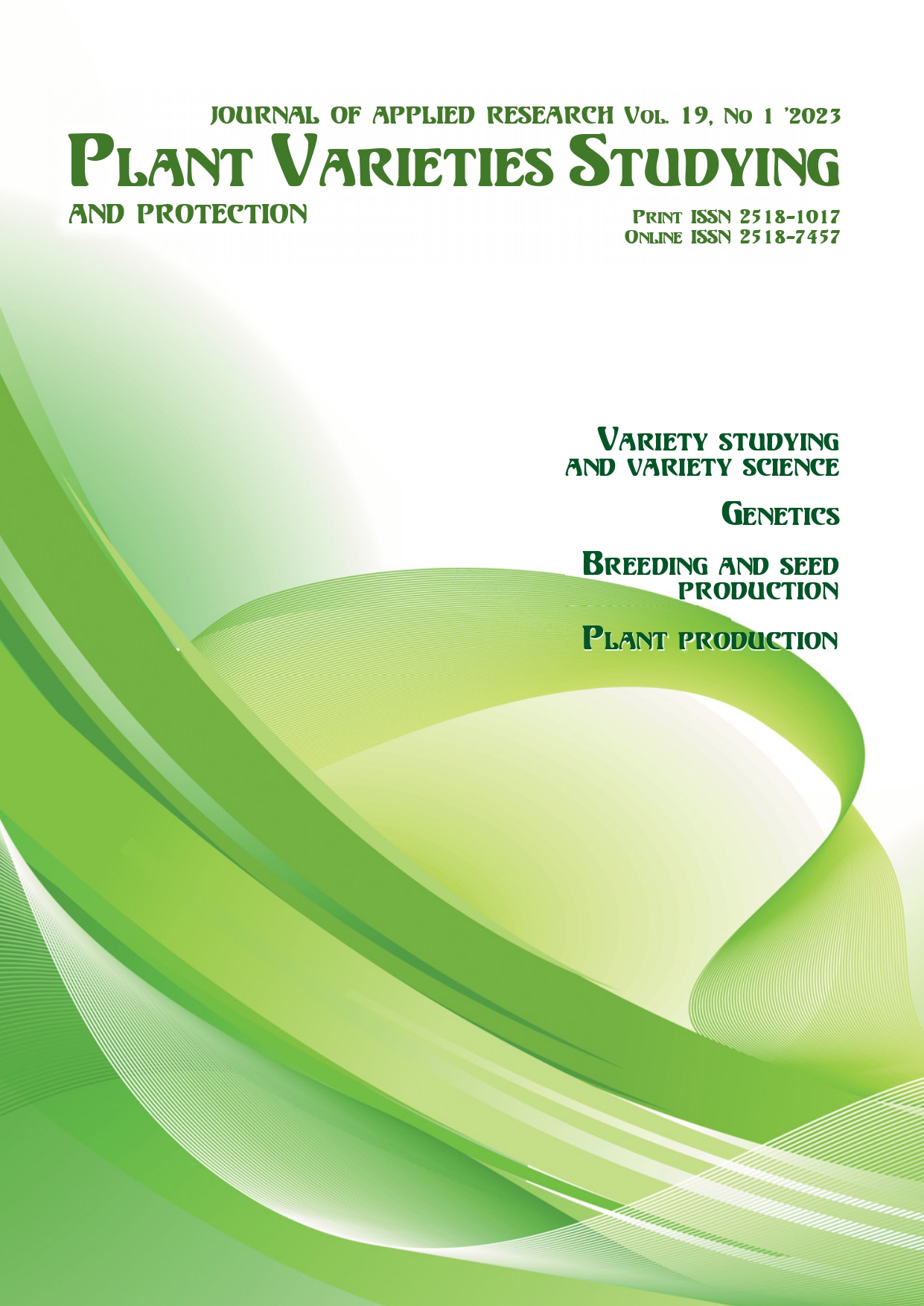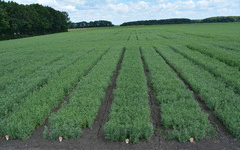Evaluation of the adaptive properties of potato varieties (Solanum tuberosum L.) according to the main economic and valuable characteristics
DOI:
https://doi.org/10.21498/2518-1017.19.1.2023.277766Keywords:
potato, starch content, dry matter content, stability, plasticity, adaptabilityAbstract
Purpose. To carry out an analysis of the ecological plasticity and stability of the characteristics of productivity, starch content, dry matter and to determine the parameters of ecological adaptability of potato varieties based on the characteristic “yield” in the soil-climatic zones of the Forest-Steppe and Polissia.
Methods. The following methods were used in the research: laboratory, computational and statistical; to draw conclusions – analysis and synthesis.
Results. The results of the analysis of potato varieties grown in different soil and climatic zones of Ukraine in terms of yield, starch and dry matter content are given. Promising varieties for selection and practical use with high indicators of adaptability, stability and plasticity were identified. It was found that the highest productivity results were obtained for the variety ‘RANOMI’ in the Forest-Steppe and Polissia zones – 34.6; 28.2 t/ha and high adaptability potential – 1.28; 1.27. The varieties ‘RANOMI’, ‘Cherie’ performed best in the Forest-Steppe zone with yields of 34.6 and 31.4 t/ha, in Polissia conditions – the varieties ‘RANOMI’, ‘PARADISO’ – 28.2 and 27.4 t/ha. The varieties with high plasticity were distinguished by starch and dry matter content (‘7 FOUR 7’, ‘PARADISO’, ‘FONTANE’, ‘RANOMI’, ‘LAUDINE’), productivity (‘7 FOUR 7’, ‘Rodriga’, ‘ALOUETTE’, ‘PARADISO’, ‘LAUDINE’). The varieties ‘Mysteriia’, ‘7 FOUR 7’, ‘LAUDINE’, ‘FONTANE’ and ‘LAUDINE’ proved to be very stable in terms of productivity and the varieties ‘Mysteriia’, ‘7 FOUR 7’, ‘Rodriga’, ‘PARADISO’, ‘RANOMI’ in terms of dry matter and starch content. The varieties with the highest productivity were ‘Rodriga’, ‘PARADISO’, and for dry matter and starch content – ‘FONTANE’, ‘LAUDINE’.
Conclusions. In different soil and climatic zones, highly plastic varieties were selected according to yield index – ‘7 FOUR 7’, ‘Rodriga’, ‘ALOUETTE’, ‘PARADISO’, ‘LAUDINE’, according to starch and dry matter content – varieties ‘7 FOR 7’, ‘PARADISO’, ‘FONTANE’, ‘RANOMI’, ‘LAUDINE’. It was found that on average for 2019–2020 the highest productivity and high adaptive potential in the Forest-Steppe and Polissia zones had the variety ‘RANOMI’ – 34.6; 28.2 t/ha, respectively, CA – 1.28; 1.27. In the Forest-Steppe zone it is worth mentioning the varieties ‘Cherie’, ‘Rodriga’ with average CA index 1.15; 1.12 and productivity – 31.4; 30.62 t/ha, in the Polissia zone – ‘PARADISO’, ‘Rodriga’ with CA value – 1.20; 1.11 and productivity – 27.4; 25.5 t/ha.
Downloads
References
Flis, B., Domanˆski, L., Zimnoch-Guzowska, E., Polgar, Z., Pousa, S. Aˆ., & Pawlak, A. (2014). Stability Analysis of Agronomic Traits in Potato Cultivars of Different Origin. American Journal of Potato Research, 91(4), 404–413. doi: 10.1007/s12230-013-9364-6
Phillips, S. L. (2005). The effect of potato variety mixtures on epidemics of late blight in relation to plot size and level of resistance. Annals of Applied Biology, 147(3), 245–252. doi: 10.1111/j.1744-7348.2005.00027.x
Kalenska, S. M., Knap, N. V., & Fedosii, I. O. (2017). Kartoplia: biolohiia ta tekhnolohiia vyroshchuvannia [Potatoes: biology and growing technology]. Vinnytsia: Nilan-LTD. [In Ukrainian]
Bondarchuk, A. A. (2008). Status and priority areas of development of the potato industry in Ukraine. Potato Farming, 37, 7–12. [In Ukrainian]
Melnyk, S. I., Kovchi, A. L., Stefkivska, Y. L., Kravchuk, I. I., & Horytska, T. V. (2017). Potato market in Ukraine. Plant Varieties Studying and Protection, 13(2), 206–210. doi: 10.21498/2518-1017.13.2.2017.105419 [In Ukrainian]
Agrawal, S, Jaiswal, R. K., Kadwey, S., Prajapati, S., & Jaswani, N. (2016). Assessment of Varietal Performance in Diverse Potato (Solanum tuberosum L.) Genotypes. International Journal of Bio-resource and Stress Management, 7(6), 1308–1314. doi: 10.23910/IJBSM/2016.7.6.1740a
Krupa, O. M., & Krupa, V. R. (2019). Potato market conjuncture in Ukraine and prospects of its optimization. Efektyvna Ekonomika, 12. doi: 10.32702/2307-2105-2019.12.86 [In Ukrainian]
Pysarenko, N., Sydorchuk, V., & Zakharchuk, N. (2022). Study of adaptive ability of potato varieties by the “yield” feature in the conditions of Central Polissia. Foothill and Mountain Agriculture and Stockbreeding, 71(1), 123–140. doi: 10.32636/01308521.2022-(71)-1-8 [In Ukrainian]
Ermantraut, E. R., Kyienko, Z. B., Matsiichuk, V. M., & Feshchuk, O. M. (2015). Ecological stability and plasticity of potato varieties in Polissia. Plant Varieties Studying and Protection, 3–4, 28–29. doi: 10.21498/2518-1017.3-4(28-29).2015.58412 [In Ukrainian]
Prysiazhniuk, L. M., Topchii, O. V., Dymytrov, S. H., Kyienko, Z. B., & Chernii, S. O. (2020). Assessment of the adaptive potential of spring rapeseed varieties (Brassica napus L.) in different soil and climatic zones of Ukraine. Plant Varieties Studying and Protection, 16(2), 144–153. doi: 10.21498/2518-1017.16.2.2020.209354 [In Ukrainian]
Sonets, T. D., Zakharchuk, N. A., Furdyha, M. M., & Oliinyk, T. M. (2020). Evaluation of potato varieties by their adaptability to the conditions of the Forest-steppe and Polissya of Ukraine. Irrigated Agriculture, 74, 148–154. doi: 10.32848/0135-2369.2020.74.27 [In Ukrainian]
Sonets, T. D., Kyienko, Z. B., Furdyha, M. M., & Vermenko, Yu. Ya. (2019). Adaptability of potato varie-ties to soil-climatic conditions of the Polissia and Forest-Steppe zone of Ukraine. Plant Varieties Studying and Protection, 15(1), 93–98. doi: 10.21498/2518-1017.15.1.2019.162488 [In Ukrainian]
Tymko, L. V., Furdyha, M. M., & Vermenko, Yu. Ya. (2018). Adaptive capacity of different potato varieties under the conditions of the Right-Bank Polissia of Ukraine. Plant Varieties Studying and Protection, 14(2), 224–229. doi: 10.21498/2518-1017.14.2.2018.134774 [In Ukrainian]
Bondarchuk, A. A., Vermenko, Yu. Ya., & Chernokhatov, L. V. (2013). Otsinka adaptyvnoi zdatnosti sortiv kartopli za zroshennia v zoni Pivdennoho Stepu Ukrainy [Assessment of the adaptive capacity of potato varieties for irrigation in the Southern Steppe zone of Ukraine]. Kyiv: KVITs. [In Ukrainian]
Horodyska, I. M., Lishchuk, A. N., Chub, A. A., & Monarkh, V. V. (2018). Annotation features of organic soybean seed production in the context of euro integration of Ukraine. Agriculture and Forestry, 2(9), 102–114. [In Ukrainian]
Dubyna, D. V., & Kordyum, E. L. (2015). Ontogenesis plasticity of vascular plants: molecular, cellular, population and cenotic aspects. Herald of National Academy of Sciences of Ukraine, 7, 32–36. doi: 10.15407/visn2015.07.032 [In Ukrainian]
Hussein, M. A., Bjornstad, A., & Aastveit, A. H. (2000). Sasg estab: A sas program for computing genotype environment stability statistics. Agronomy Journal, 92(3), 454–459. doi: 10.2134/agronj2000.923454x
Tkachyk, S. O. (Ed.). (2016). Metodyka provedennia ekspertyzy sortiv roslyn hrupy tekhnichnykh ta kormovykh na prydatnist na poshyrennia v Ukraini [Methodology for examination of plant varieties of the technical and fodder group for suitability for distribution in Ukraine]. (3rd ed., rev.). Vinnytsia: Nilan-LTD. [In Ukrainian]
Tkachyk, S. O. (Ed.). (2015). Metodyka derzhavnoi naukovo-tekhnichnoi ekspertyzy sortiv roslyn. Metody vyznachennia pokaznykiv yakosti produktsii roslynnytstva [Methodology of state scientific and technical examination of plant varieties. Methods of determining plant production quality indicators]. (4rd ed., rev.). Vinnytsia: Nilan-LTD. [In Ukrainian]
Eberhart, S. A., & Russell, W. A. (1966). Stability Parameters for Comparing Varieties. Crop Science, 6(1), 36–40. doi: 10.2135/cropsci1966.0011183X000600010011x
Mazur, O. V., & Mazur, O. V. (2019). Plasticity and stability of leguminous crops according to economically valuable traits and selection indices. Agriculture and Forestry, 4, 111–136. doi: 10.37128/2707-5826-2019-3-4-10 [In Ukrainian]
Said, A. A., Motawea, M. H., Hassan, M. S., & Roshdy, R. (2020). Mean performance and stability parameters for comparing some bread wheat cultivars under different environments. SVU-International Journal of Agricultural Science, 2(2), 484–497. doi: 10.21608/svuijas.2020.47432.1047
Furdyha, M. M. (2022). Adaptive ability and potential properties of potato varieties selected by the Institute for Potato Research NAAS. Agrarian Innovations, 12, 103–109. doi: 10.32848/agrar.innov.2022.12.16 [In Ukrainian]
Bilousova, Z. V. (2018). Evaluation of adaptive potential of winter wheat (Triticum aestivum L.) varieties in the conditions of Southern Steppe of Ukraine. Scientific reports of National University of Life and Environmental Sciences of Ukraine, 3. doi: 10.31548/dopovidi2018.03.013 [In Ukrainian]
Bykin, A. V., & Panchuk, T. V. (2022). Indicators of the quality of potato tubers under local application of mineral fertilizers. Taurian Scientific Herald, 126, 9–15. doi: 10.32851/2226-0099.2022.126.2 [In Ukrainian]
Zhang, W., Liu, X., Wang, Q., Zhang, H., Li, M., Song, B., & Zhao, Z. (2018). Effects of potassium fertilization on potato starch physicochemical properties. International Journal of Biological Macromolecules, 117, 467–472. doi: 10.1016/j.ijbiomac.2018.05.131
Klasyfikator pokaznykiv yakosti botanichnykh taksoniv, sorty yakykh prokhodiat ekspertyzu na prydatnist do poshyrennia [Quality index of botanical taxon quality assorted for suitability for distribution]. (2019). Vinnytsia: Tvory. Retrieved from https://sops.gov.ua/uploads/page/vidanna/2019/1.pdf
Melnyk, A. V., Prysiazhniuk, O. I., & Bondarchuk, I. L. (2016). Estimation of stability and plasticity of yield indicators of winter rape varieties and hybrids in different agroclimatic zones of Ukraine. Bulletin of Sumy National Agrarian University. Series: “Agronomy and Biology”, 9, 145–149. [In Ukrainian]
Temesgen, T., Keneni, G., Sefera, T., & Jarso, M. (2015). Yield stability and relationships among stability parameters in faba bean (Vicia faba L.) genotypes. The Crop Journal, 3(3), 258–268. doi: 10.1016/j.cj.2015.03.004
Downloads
Published
How to Cite
Issue
Section
License
Copyright (c) 2023 Korol, . L. V., Topchii, O. V., Ivanytska, A. P., Bezprozvana, I. V., Piskova, O. V., Kostenko, A. V.

This work is licensed under a Creative Commons Attribution-ShareAlike 4.0 International License.
Starting in 2022, the copyright to the publication remains with the authors
Our journal abides by the CREATIVE COMMONS copyright rights and permissions for open access journals.
Authors, who are published in this journal, agree to the following conditions:
- The authors reserve the right to authorship of the work and pass the first publication right of this work to the journal under the terms of a Creative Commons Attribution License, which allows others to freely distribute the published research with the obligatory reference to the authors of the original work and the first publication of the work in this journal.
- The authors have the right to conclude separate supplement agreements that relate to non-exclusive work distribution in the form in which it has been published by the journal (for example, to upload the work to the online storage of the journal or publish it as part of a monograph), provided that the reference to the first publication of the work in this journal is included.

























 Ukrainian Institute for Plant Varieties Examination
Ukrainian Institute for Plant Varieties Examination  Селекційно-генетичний інститут
Селекційно-генетичний інститут Institute of Plant Physiology and Genetics of the National Academy of Sciences of Ukraine
Institute of Plant Physiology and Genetics of the National Academy of Sciences of Ukraine
 The National Academy of Agrarian Sciences of Ukraine
The National Academy of Agrarian Sciences of Ukraine